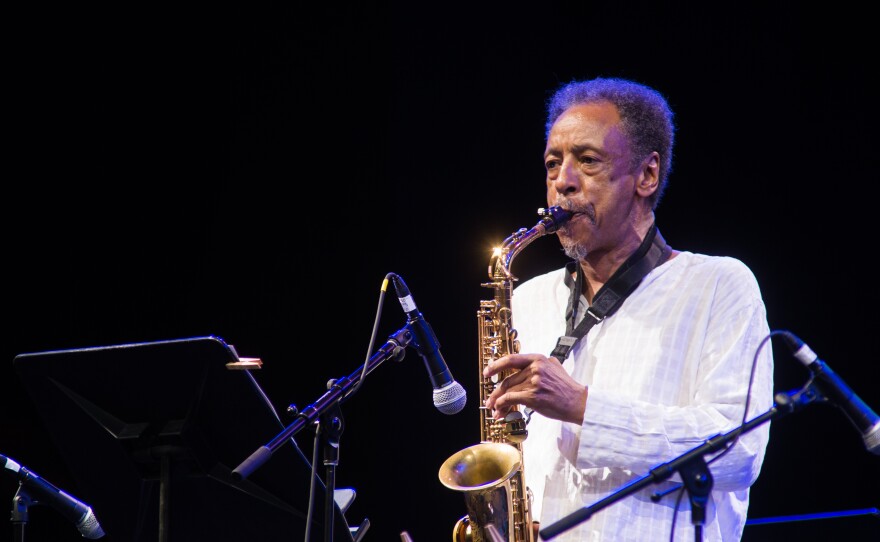The 2021 NEA Jazz Masters cover a dizzying range of style between them, and more than 200 years of working experience. Below, find tributes in the form of one track apiece, plus a wildcard. And don’t miss the photos in our slideshow above, most taken by WBGO’s own Jonathan Chimene.
Tune in to the NEA Jazz Masters virtual ceremony this Thursday, April 22, at 8 p.m. ET, on the air at WBGO 88.3 FM and here at wbgo.org.
Henry Threadgill, “Salute to the Enema Bandit”
Ever indefatigable, sometimes inscrutable, saxophonist and flutist Henry Threadgill has been an American original since his earliest known musical output in the 1970s. The NEA Jazz Masters fellowship is the latest honor in a career that also includes a Guggenheim Fellowship and one of the only Pulitzer Prizes for a jazz musician (for his 2015 work In For a Penny, In For a Pound, featuring the longtime ensemble Zooid).
Albert “Tootie” Heath / Ethan Iverson / Ben Street, “Bags’ Groove”
The youngest of the Heath brothers played his first recording date with John Coltrane in 1957 — an auspicious start to a colorful career. Tootie Heath’s beat has always been firm but alert to nuance; look no further than the work he did 60 years ago with bassist fellow NEA Jazz Master Ron Carter on Bobby Timmons’ In Person (or, for that matter, his reunion with Carter on Polaris, an album by guitarist Greg Skaff released this year).
Another exhibit for the jury would be the 2015 album Philadelphia Beat, featuring Heath’s trio with Ethan Iverson on piano and Ben Street on bass. It opens with a version of “Bags’ Groove” — the Milt Jackson tune that Tootie surely played with older bro Percy Heath during his time in the Modern Jazz Quartet. Listen for how he states the initial pulse on finger cymbals, already swinging.
Terri Lyne Carrington, “Giggles”
Drummer, composer and bandleader Terri Lyne Carrington has received no shortage of accolades over the last decade — a period that saw her win three Grammy awards and a Doris Duke Artist Award along with this honor from the NEA. But Carrington, a former child prodigy, has been an unstoppable force since well before the turn of the century.
So it seemed like a good time to revisit Jazz Is a Spirit — her second album, released on the ACT label in 2002. The album features Herbie Hancock as a heavyweight cameo, and Wayne Shorter as a guiding spirit. But on “Giggles,” a Carrington original with a playful melody and a willfully modern sensibility, the focus falls squarely on tenor saxophonist Gary Thomas, and the way he sparks again a rhythm section with Robert Hurst on bass, Paul Bollenback on guitar and Greg Kurstin on piano. Listen to how much dynamic sensitivity Carrington brings to the beat, especially behind a guitar solo that opens by citing Shorter’s “Nefertiti.”
Charlie Parker, “Tune Z (Alternate Take 9)”
Phil Schaap, who holds the 2021 A.B. Spellman NEA Jazz Masters Fellowship for Jazz Advocacy, has been a fount of jazz insight and arcana on the air in New York for the last 50 years. He spent a small portion of that time at WBGO — but his signature achievement is Bird Flight, a weekday-morning Charlie Parker disquisition on WKCR, where he got his start as a Columbia undergrad. Schaap has also produced his share of historical albums, including Unheard Bird, a 2016 collection of false starts, alternate takes and other curios from the Clef and Mercury vault.
Cassandra Wilson, “I Didn’t Know What Time It Was”
Now here’s that wildcard. Customarily we like to find a track that features at least two members of an NEA Jazz Masters class playing together. Because Heath and Carrington are both drummers, that proved harder than usual this year. And it’s possible that I’m missing a direct link between Carrington and Threadgill — but we have an indirect link that makes up it, in the form of Cassandra Wilson. Early in her career, Wilson toured with Threadgill’s trio Air, appearing on the album Air Show No. 1 in 1987. The following year, she released the standards album Blue Skies, on JMT.







More Stories
This was a gig to match its excellence: Olie Brice at the Vortex: Video, Photos
In tune with Jefferson Berry: A unique blend of acoustic urban storytelling: Videos, Photos
If he were a guitarist he’d be as well-known as Eric Clapton, but Terry Hanck is a sax player! Videos, Photo